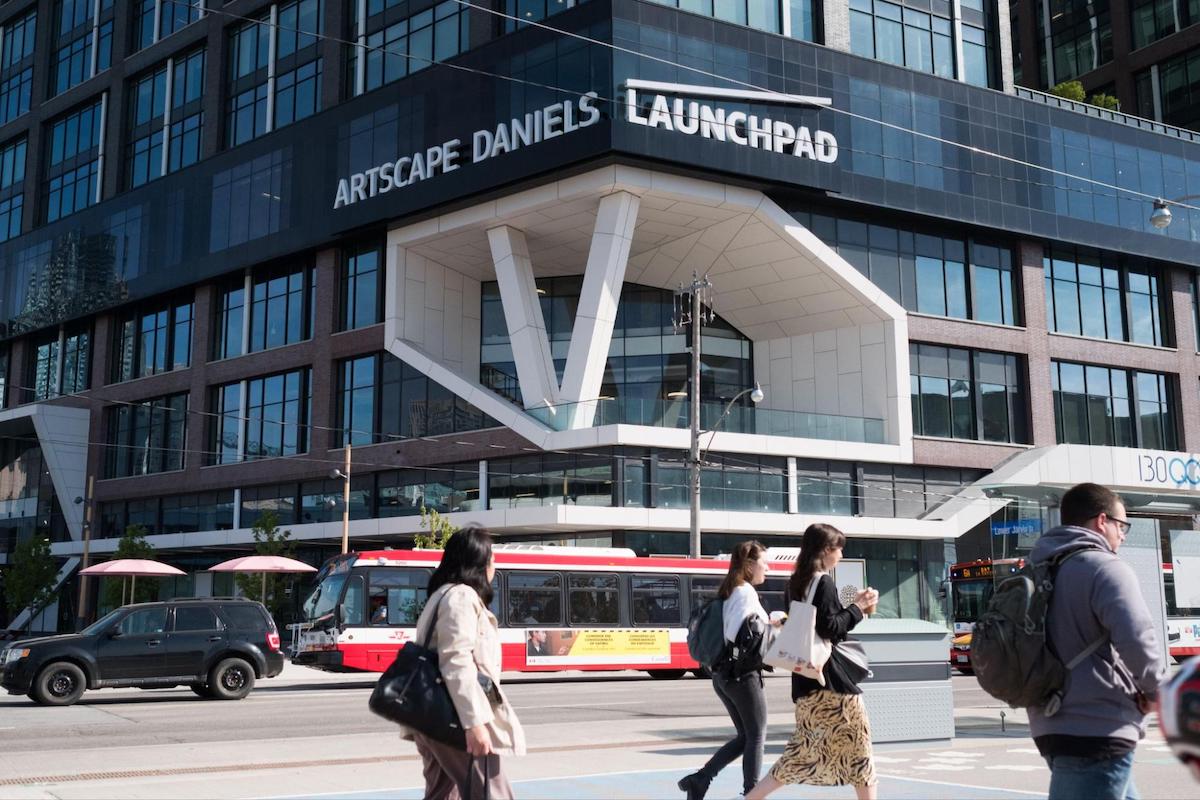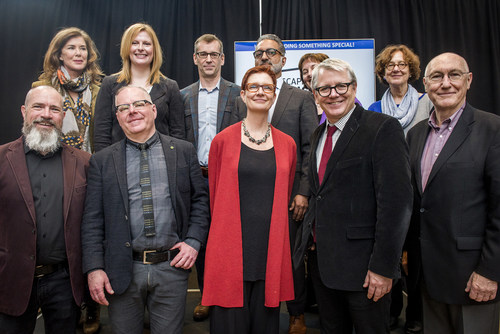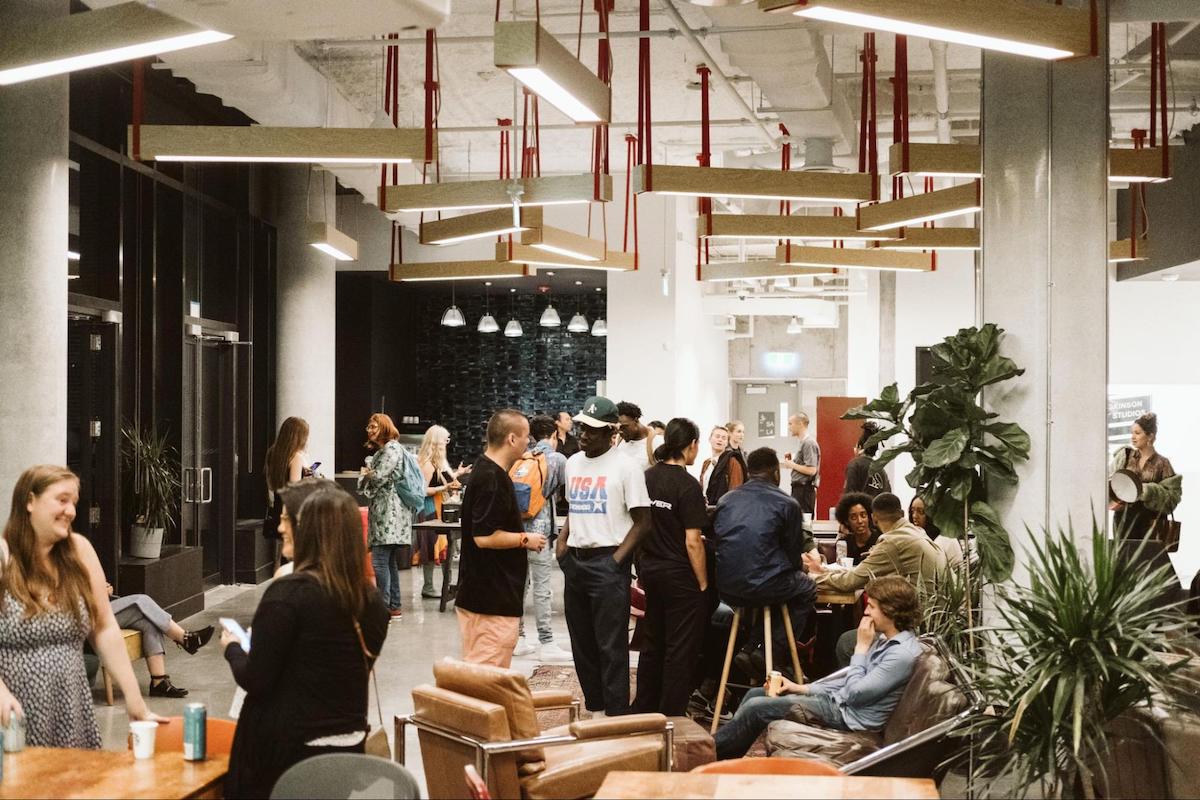Cash crunch forces Toronto’s Artscape to list newly-built Launchpad for $22.5 million as workers seek to unionize
Why It Matters
The COVID pandemic has been tough on many organizations that own real estate, including non-profit organizations and arts venues. Experts say Artscape’s sale may result in yet another loss of space for Toronto’s arts community.

A massive waterfront co-working space, once touted as a future home for thousands of Toronto artists, is up for sale for $22.5 million as one of the city’s leading non-profit developers attempts to dig its way out of debt.
Daniels Launchpad, one of 14 sites operated by Toronto Artscape Inc., will be sold as part of a restructuring plan approved by the organization’s board in May. The non-profit is at risk of running out of cash this August; Toronto City Council passed a motion to guarantee a $1.5 million line of credit, but the lender has yet to approve an extension for the organization, which also laid-off eight workers in an effort to reduce costs.
Further listings and lay-offs haven’t been ruled out.
Artscape currently holds $36 million in debt, according to Grace Lee Reynolds, Artscape’s CEO. The organization, like many offering co-working and leasing space, is facing economic headwinds as millions of workers opt to work-from-home and many workplaces downsize.
Rudy Ruttimann, former founding executive director of SKETCH Working Arts, a non-profit that also offers arts space and programming, said Artscape’s recovery will hinge on the successful sale of Daniels Launchpad and the ability to obtain advantageous terms for future loans, as well as the speedy return of patrons.
In addition to the waterfront hub, the non-profit developer has partial ownership of at least two other sites: Artscape Triangle Lofts, where it rents affordable live and work units to artists, and Artscape Youngplace, where it leases office space to artists and arts organizations. Some of the non-profit’s other facilities, including Artscape Wychwood Barns and Artscape Daniels Spectrum are leased.
Lee Reynolds wouldn’t say whether there are plans to sell off other assets and stressed Artscape is taking the restructuring “step-by-step.”
The non-profit developer is working hard to identify a buyer for Daniels Launchpad who will continue to support Toronto’s creative sector, she said. But despite assurances, some are worried such a buyer may not materialize, eliminating yet another local arts venue.
Amid this restructuring, a group of Artscape workers are also seeking to unionize; they want a living wage for all staff, seniority-based layoffs should further down-sizing occur, and more input in the organization’s long-term plans.
Lee Reynolds said the pandemic is the central cause of the non-profit’s financial challenges.
Others who spoke to Future of Good agreed the pandemic was the kiss-of-death for Daniels Launchpad, but both current and former staff said the non-profit was already showing signs of strain before COVID-19 arrived, due to a heavy debt load and disappointing sales at the waterfront hub.

A “big vision”
Founded in 1986 with a mission to provide affordable space for artists, Artscape sketched out its plans for Daniels Launchpad during a boom in the city’s real estate market and a time of rapid expansion for the non-profit organization.
Former CEO Tim Jones sought to bring the organization’s brand of “creative placemaking” from the “margins to the mainstream” in a bid to turn the tide on the city’s growing affordability crisis, according to a 2017 report. Under Jones’ guidance, Artscape added several new properties and more than doubled the value of its assets from $47.3 million to $95 million between 2015 and 2020.
But in some ways, Daniels Launchpad was special.
Whereas previous facilities catered heavily to established artists, sculptors, painters and muralists, one former Daniels Launchpad staff member said the new site was meant to offer something different and appealed to a new cohort of young creative entrepreneurs.
“The vision behind the building was really significant,” said Jory Cohen, director of finance and impact investment for the Inspirit Foundation, an early investor in the project. The facility was intended to be a “creative hub,” providing a vast array of expensive, hard-to-acquire tools and communal space at an affordable price, he said.
With the support from all three levels of government, private philanthropists, and impact investors, Artscape purchased 35,000 square feet of space on the fourth floor of a tower being developed by the Daniels Corporation on Toronto’s waterfront.
One former staff member, who requested anonymity to preserve future employment opportunities, said Daniels Launchpad was “unprecedented” when it opened in 2019.
Staff would give visiting celebrities tours of the space, showing off the state-of-the-art equipment it offered filmmakers, jewellers, woodworkers, fashion designers and other creatives. “Every time I’d tell somebody about it they’d be gobsmacked that we were able to get this done,” he said.
But just below the pomp and optimism, there were growing challenges, the former staffer added.

While the site provided creatives with valuable networking opportunities, mentorship and access to specialized tools, it was tough to get people to pay for the services and resources the space offered. Staff, many of whom were artists themselves, hustled to sell memberships and studio spaces, but said it wasn’t easy.
Many creatives make art at home using little more than a cell phone or computer, the former employee pointed out. “I compare it to a $150 gym membership…If you’re an artist struggling to make a living, let alone make a living in the arts sector, do you have [money for that]?”
Artscape tried to make the space more accessible by offering bursaries and sold organizational memberships to institutions like George Brown College, which purchased bulk passes for students, Cohen said.
But the organization was carrying a lot of debt, which concerned some workers. In a written statement, pro-union staff said the non-profit would leverage money raised for new developments to fund operational defecits, a practice they described as “unsustainable.”
They also described internal friction.
“Positions are cut and then never filled. Jobs are merged. With these changes, workers are rarely if ever consulted and their perspectives and insights largely ignored.”
When the pandemic hit, the space closed for more than a year and event revenue dropped to zero, said Lee Reynolds, who became Artscape’s CEO in April 2021. Any momentum Daniels Launchpad had built came to a standstill.
“What they had built out there was really exciting, but COVID was bad for the industry — not-for-profit and the arts — so they had a double-whammy,” said Ruttimann.
Struggling to manage their debt, Cohen said Artscape was permitted to defer interest payments on $500,000 they had borrowed from the Inspirit Foundation, but the organization’s challenges have continued. “And they just haven’t been able to recover,” he said.
Financial woes
“It’s bad,” Ruttimann said after looking over Artscape’s 2021 financial statements at Future of Good’s request.
The organization is carrying $36 million in debt, a lot for most organizations and a particularly daunting sum for one looking to revive its business, while covering debt repayment costs and operating expenditures for 14 facilities, she said.
To help stem the bleeding, Artscape’s executive team took a 20 per cent voluntary pay cut around the same time this spring that some staff were let go. But workers pushing for unionization said more could have been done to prevent job losses if management had been proactive and allocated resources more strategically.
“We know that since the reopening of our venues, the events team has seen very high demand for bookings, yet has not been given the adequate staffing needed to run events, despite strong bottom-up efforts to generate much-needed revenue for Artscape,” they said in the statement provided to Future of Good.
But despite efforts to reduce expenses, cash remains very tight.
While waiting for Daniels Launchpad to sell, the non-profit has asked existing lender Toronto Dominion Bank to extend its line of credit by $1.5 million to $6.5 million total. To reduce risk, the bank requested the City of Toronto guarantee the credit extension, which City Council agreed to on July 19.
Councillor Shelley Carroll, chair of the city’s economic and community development committee, said it’s “essential” the city preserve the 390 affordable housing and working spaces for artists Artscape offers. “Artscape is in the process of restructuring their operations for long-term financial stability, at which point the line of credit extension will be repaid to the City,” she said.
Mitchell Cohen, president and CEO of Daniels Corporation and a major philanthropic supporter of the Daniels Launchpad project, said he is hopeful Artscape is able to find a buyer who “shares our collective vision for inclusive growth of the creative economy.”
Others share that optimism, including Ruttimann. “In my dream it would be someone who comes along and partners with them, because they do tremendous work,” she said.
But the long-time arts non-profit executive is pragmatic about the uphill battle Artscape faces. Mirroring commercial workspace patterns across the country, traffic at Artscape Youngplace, where SKETCH owns offices, is down considerably, she said. “It’s going to take a long time [to recover].”
Unionization pursued, higher pay, seniority wanted
Some Artscape workers are drawing strength from organized labour and looking to unionization as a solution to some of the issues faced by staff.
Artscape workers hosted a recent town hall and social event at the Ontario Public Service Employees Union office in Toronto, inviting custodians, accountants, building operators and other staff to attend.
The group is asking for a $23 per hour living wage guarantee for all workers, seniority-based layoffs and transparency should further down-sizing occur, as well as more decision-making power. In a statement to Future of Good, workers noted the Ontario Not-for-Profit Corporations Act allows up to one third of a non-profit’s board to be employees. (There are currently no workers on Artscape’s board.)
In their union drive effort, employees said they’re drawing inspiration from striking Starbucks and film and TV writers south of the border, but also from unionized culture workers closer to home. Staff at both the Art Gallery of Ontario and the Royal Ontario Museum are unionized; and in April 2021, a group of about 50 employees of the Power Plant Contemporary Art Gallery in Toronto also voted ‘yes’ to unionizing with the Ontario Public Service Employees Union.
“We’re also hoping to be an organized collective voice to say that the story of ‘starving artists’ is used against arts and culture workers to accept poor working conditions,” Artscape workers said in their statement.
“We want to inspire other arts and culture workers to come together and organize to demand more funding from our bosses and the state.”
Asked about the union drive, Lee Reynolds said she believes workers being engaged in their workplace is a good thing. But she is also hopeful workers considering forming a union are willing to speak with management about their concerns.
“It’s a tricky time right now,” she said. “[And] I’d like to think right now that we’re creating an environment where there can be communication.”
Hindsight
Artscape Daniels Launchpad was created at a time when debt was flowing fast and it was possible for a connected non-profit developer to finance a dream property on the shore of the city’s waterfront — but it was always a risk.
While due-diligence was done, it was an “untested” model and a “first-of-its-kind” space, said Cohen. Moreover, the project was hit by a public health catastrophe nobody could have predicted. “I think it was a worthwhile attempt, it just — timing didn’t give it its fair shot,” he said.
Despite the setback, Lee Reynolds said Artscape’s mission remains the same: To provide places and spaces for artists and creatives — a mission they can achieve as a property owner or property manager.
But the former Daniels Launchpad worker is fearful something may be lost in the difference.
Before 130 Queens Quay St. E. was a tower that housed Daniels Launchpad, it was the Guvernment nightclub — a site where DJs played for thousands of partygoers, he said.
“If it turns out to be just another corporation who’s going to gut the place and turn it into offices…then it’s just another number on the list of great places for artists that artists no longer have access to.”
